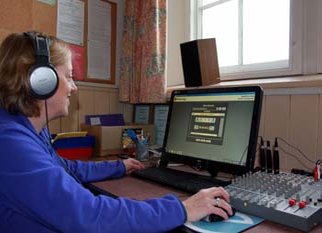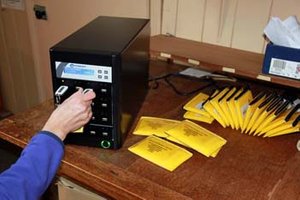South Lakes Talking Newspaper Association
Volunteers
Producing the Talking Newspaper
We have over 60 volunteers involved in producing the Talking Newspaper, working on a rota basis. We do this by using a computerised programme which enables us to create a record for each listener and, using a digital scanning system, we are
able to monitor the frequency of sending out our recordings to each listener.
We are always looking for new volunteers. If you have a particular skill or interest in reading, script editing or in computing, we should love to hear from you. Appropriate training will be given.
Maintaining our Talking Newspaper at a high standard is a challenge which our volunteers work hard to achieve. The substantial reward is knowing how much our efforts are appreciated by our listeners.
If you would like to know more about volunteering opportunities, please contact us.
Our Team
Carolyn Bird, Editor and Editors' Team Leader.
The duty editor is responsible for the content of the week's recording. This involves identifying items to be included, editing them, if necessary, to produce a more concise report, then sorting them into a number of tracks covering a variety of themes, for example, main news stories, people in the news, births and deaths, sport, arts and entertainment and so on. The aim is to produce a recording which has interest and variety and which listeners will enjoy. Script editors have about six editing slots per year on the rota.
The production of scripts is challenging, but always interesting, and the reward is in the knowledge of a job well done and the very real appreciation of our listeners.
Hazel Booth, Committee Listener Representative.
Because I'm visually impaired, I find the Talking Newspaper really helpful in keeping me in touch with local news.
I'm a member of a number of groups for people with sight problems, so I'm in contact with a lot of ideas that others have about the Talking Newspaper. As a committee member, I'm able to pass on these ideas to the people who organise the readings and recordings, so that they can give the listeners what they want and what they find helpful.
Bruce Carnaffin, Recording Team Leader.
As Recording Team Leader I am responsible for technical matters in respect of our recording and computer equipment.
When recording we work in teams of three readers, one of whom is the Team Leader who is responsible for making the recording. Readers operate on a rota basis, reading about 8-10 times a year.
Our aim is to put across as interestingly as possible the scripts which have been assembled. We are not looking for a particular type of person to read and certainly not a particular accent. Variety in voices, both male and female, is the ideal, and what we try to achieve is clarity and expressiveness. Our readers enjoy what they do and have the satisfaction of communicating directly with our listeners.
Bill Barrington, Registrar.
My main role is to keep an up to date register of our listeners. We do this by using a computerised programme called Keep Track. This enables us to create a record for each listener and, using a digital scanning system, we are able to monitor the frequency of sending out our recordings to each listener. The data base is updated weekly. Amongst other things, it enables us to produce reports on the number receiving the Talking Newspaper each week.
When applications are received from new listeners, we create a record on the computer and then arrange to take the latest recording and a speaker player to the listener's home. This enables us to explain how the equipment works and also helps us to establish a personal link with our listeners, making it easier for them to contact us if at any time they have any queries.
I find it is always a very rewarding and uplifting experience to visit so many varied and interesting people.
Martin French, Copying Team Leader.
I am responsible for the copying of recordings and for organising the collection of the pouches containing the returned memory sticks from Kendal Post Office and taking them to the studio where the weekly recordings take place. Once the recording has been made, we copy it onto the memory sticks and put them into the pouches. The pouches are booked out via a bar code and are then taken to the Post Office for despatch through its free of charge service to the visually impaired.
We see ourselves as the vital final link in the chain and enjoy what we do.

